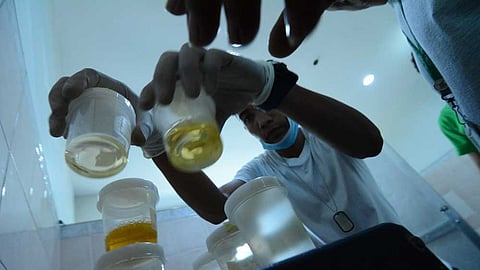

A QUARTER of a billion people, or some five percent of the global adult population, is estimated to have used drugs at least once in 2015, according to the World Drug Report 2017.
In the Philippines, while the number of drug users is in dispute, the number of drug surrenderers is not. It’s more than 1.3 million, according to the Philippine Drug Enforcement Agency.
How did it come to this?
What’s more disturbing is that the drug users work for the government.
Last year, the Cebu Provincial Anti-Drug Abuse Office (Cpadao) conducted random drug tests on more than 10,000 local government employees, including barangay and government officials.
“Of the 10,000 tested in 2017, less than 1,000 tested positive. Most of those who tested positive were job order employees,” said Cpadao executive director Carmen Remedios Durano-Meca.
The Cpadao has conducted random drug testing in all the local government units (LGUs) under the Cebu Provincial Government, she said, and right now, it is focused on the testing of Philippine National Police personnel per station.
Last year, it started conducting random drug testing on the Department of Education’s (DepEd) teaching and non-teaching staff.
The Province of Cebu has a contract with a Department of Health (DOH)-accredited diagnostic center that conducts the drug test screening. Cpadao provides the drug testing kits.
The count of 10,000 government employees tested excludes the policemen, teachers and Bureau of Jail Management and Penology personnel who were also tested on the request of the bureau.
If one considers that only those who were present during the surprise drug tests were tested, then Meca estimates that Cpadao has tested 70-80 percent of all local government employees already.
There aren’t that many employees to begin with.
“Municipal employees number only around 60-100, except in the city, where they could reach 300 to 400 employees. And the testing is random,” she said.
The Cpadao’s target for drug testing this year is about 10,000 government employees also.
Suspended
In Cebu City, which is not under the jurisdiction of the Cebu Provincial Government, DepEd-Cebu City Division assistant schools division superintendent Dr. Danilo Gudelosao said the Cebu City Office for Substance Abuse Prevention (Cosap) had conducted drug testing on all the personnel of the division, including the drivers and utility people, “and I’m happy to report that we all tested negative.”
School heads, assistant school heads and principals also tested negative. Only two principals had not been tested because they were on leave during the unannounced drug test. But they showed their willingness to be tested by showing up at the Cosap.
Teachers
Of the division’s 5,500 teachers, only 200 teachers from 13 public schools have been tested, however, because last September, the DepEd Central Office advised them “to hold in abeyance the drug testing” while it reviewed its guidelines on the handling of the drug test results, Gudelosao said.
“There was an issue on who should administer the testing to really keep the results confidential,” he said of the nationwide suspension of drug testing on DepEd personnel.
He said the DOH may take over the testing, submitting the results directly to DepEd.
Cosap is continuing its random drug testing with the barangays. Earlier this month, Cosap said it had conducted drug tests on more than 700 employees in Cebu City Hall.
Positive
Have drug testing and the consequences of testing positive been enough to deter drug use?
Under Civil Service Commission Memorandum Circular 13, series of 2010, any government official or employee found positive for drug use should be dismissed from the service at the first offense.
But the Province is not strictly following the Civil Service regulation.
Last October, Gov. Hilario Davide III said that while job-order workers who tested positive would immediately be asked to resign, casual or regular employees would be monitored to determine whether their addiction was severe, before a decision would be made on their termination.
“They are still screened for their degree of drug addiction because the purpose of the drug test is not to sanction them but to help them get rehabilitated,” Meca said.
Employees who are not dismissed are required to join the DOH program for rehabilitation, which is a separate program from the one for Oplan Tokhang surrenderers, Meca said.
As for the job order employees, since in most cases, their contracts were not renewed, it is up to them to join any rehab program if they wish to be rehabilitated, she said.
Meca could not say how many government employees in Cebu had been fired from their jobs as a result of their addiction, saying since dismissal was at the discretion of the local chief executives, her office had not monitored the action taken on those who had tested positive in drug tests.
“The Cpadao’s role is just to give them the confirmatory result. Then (the fate of the drug user) is already at the discretion of the LGU, guided by the Civil Service regulation.” (CTL)